If you run a business in Canada, keeping personal information safe is critical. When a data breach happens, figuring out if it’s serious enough to report can be tricky. That’s where the Office of the Privacy Commissioner of Canada (OPC) comes in with a new tool to make this process easier for your organization.
What’s a Data Breach and Why Does It Matter?
A data breach occurs when personal information, such as names, addresses, or credit card details, are exposed to unauthorized access, stolen, or lost. Under PIPEDA, if a breach could realistically cause a real risk of significant harm (or “RROSH”) to people, you must report it to the OPC and notify the affected individuals.
Significant harm could include things like:
- Identity theft
- Financial loss
- Damage to someone’s reputation or relationships
- Loss of job or business opportunities
- Negative impacts on credit scores
To decide if a breach is serious, you need to look at two key factors:
- Sensitivity of the information: Is it something private, like health records or financial details?
- Likelihood of misuse: Could someone use the stolen data to cause harm?
Keep in mind, you’re required to keep records of all breaches for at least two years.
How the OPC’s New Tool Makes Things Easier
The OPC’s new security breach assessment tool is like a guide that walks you through whether a breach needs to be reported. It’s user-friendly and helps you figure out if there’s a RROSH.
To begin, you answer a series of questions about the breach, such as:
- What kind of personal information was exposed (e.g. names, emails, or financial data)?
- How many people were affected?
- How did the breach happen (e.g. a hack, lost device, or human error)?
- Who might have accessed the information?
- What’s the connection between the affected people and the person or group who got the data?
Based on your answers, the tool estimates whether the risk of harm is “Likely” or “Unlikely.” This helps you decide if you need to report the breach to the OPC and notify affected individuals.
Why This Tool Is a Game-Changer
Here’s what makes the tool helpful:
- Privacy-first design: It doesn’t collect or send any of your data to the OPC, and it doesn’t ask for details that could identify your organization
- Downloadable results: You can save the tool’s assessment to include in your internal breach records or even attach it to a report you send to the OPC
- Clear guidance: The questions make it easier to understand what matters when assessing a breach
However, keep in mind that the tool’s results are just a guide, they don’t legally bind the OPC, and you’ll still need to use judgment or rely on legal advice to comply with PIPEDA.
How to Use This in Your Business
If your organization handles personal information, here’s how you can put this tool to work:
- Access the tool: Visit the OPC’s website to use the breach assessment tool: Assess if a privacy breach poses a real risk of significant harm to an individual – Office of the Privacy Commissioner of Canada
- Gather breach details: Before using the tool, collect key facts about the incident, like what data was involved and how the breach occurred
- Run the assessment: Answer the tool’s questions honestly to get a clear picture of the risk
- Keep records: Save the results as part of your data breach records, and decide if you need to report the breach to the OPC and/or notify affected individuals
- Act fast: If the tool suggests a “Likely” risk of harm, take quick steps to follow PIPEDA’s reporting and notification rules
While data breaches are stressful, the OPC’s new tool can reduce some of the guesswork out of deciding what to do next. By guiding you through the process of assessing a breach, it helps ensure you’re meeting your legal obligations while protecting your customers’ trust.
Don’t Forget About Cyber Insurance
If your organization handles any personal information or could be subject to another form of attack (such ransomware), Cyber Insurance is critical to protecting your business.
- Learn more about insurance company requirements for Cyber Insurance (Staebler.com)
Beyond just the coverage for those attacks, Cyber Insurance policies also bring with them access to expert breach counsel, consultants, and IT security professionals to help you go through all the forensic and recovery steps following a covered cyber attack. These services can be invaluable to a business following a breach event and can even help with assessments of RROSH (as previously discussed).
For more details on cyber insurance and what steps you can take to help protect your business, reach out to a Staebler Insurance Broker today.
. . .
Staebler Insurance is a general insurance broker specializing in car insurance, home insurance, small business insurance, and commercial insurance. Staebler Insurance Brokers proudly serve Kitchener, Waterloo, Cambridge, Guelph, Stratford, Listowel, Fergus, Elora, Wellington County, Perth County, Waterloo Region, the Greater Toronto Area, Golden Horseshoe, Niagara Region, and all over beautiful Ontario, Canada. Get a Quote to get started today.














0 Comments